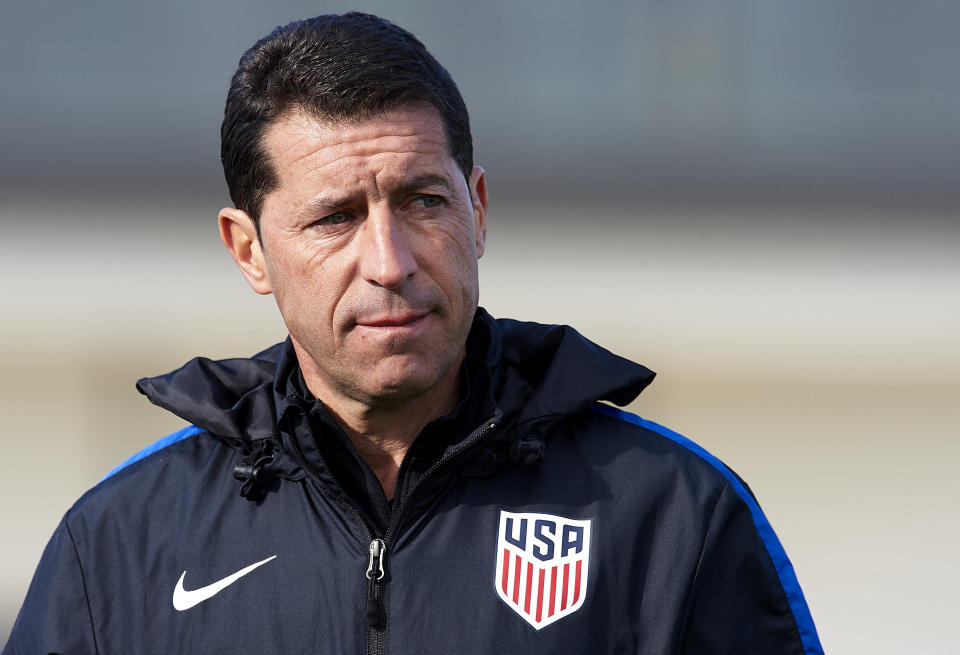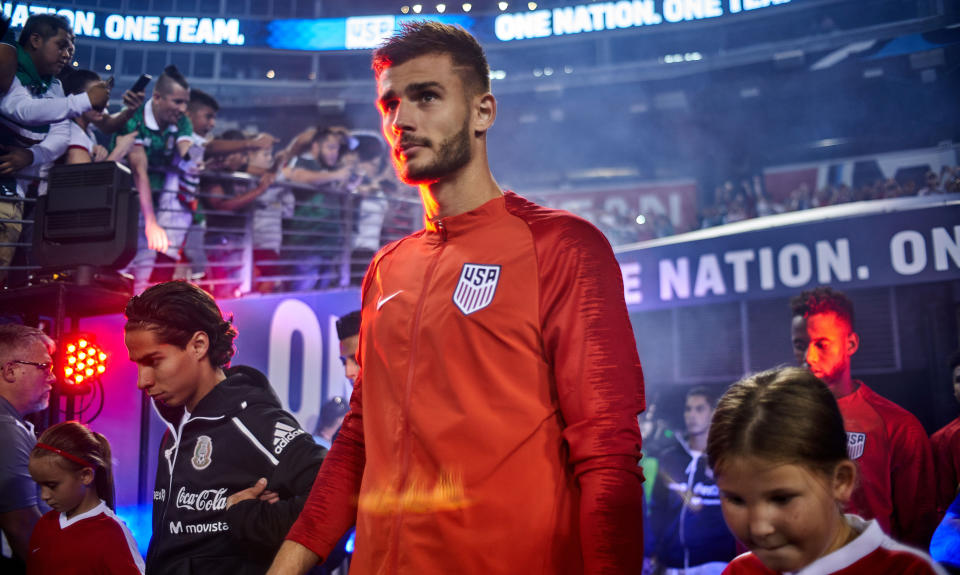Amid U.S. Soccer's senior team turmoil, record-setting Tab Ramos has kept youth levels thriving
When Tab Ramos’ United States team takes the field against Ukraine on Friday in their opening match of the 2019 U-20 World Cup in Poland, the Hall of Fame midfielder-turned-coach will have played or managed in more FIFA finals than any man in history.
“I had no idea,” Ramos, 52, told Yahoo Sports. Then he laughed. “It just makes you think how old you are.”
Born in Uruguay and raised in New Jersey, Ramos represented the U.S. in the U-20 World Cup, known then as the World Youth Championship, before helping the U.S. reach its first senior World Cup in four decades in 1990.
He played in two more Cups before retiring in 2002 and turning his attention to developing youngsters. Ramos was named U.S. U-20 boss after the Americans failed to qualify for the global showpiece in 2011. Later, the role of U.S. Soccer’s youth technical director was added to his title.
And while the senior team struggled with consistency through most the chaotic Jurgen Klinsmann era, Ramos, who served as Klinsmann’s assistant the 2014 World Cup, provided much-needed stability in the youth ranks. The results, too, have been eye-opening.
The Americans had never won a CONCACAF U-20 title before Ramos was hired; his teams have taken home the last two, beating Mexico, a former world champion at that age level, both times. At the U-20 World Cup, Ramos’ team came within inches of reaching the semifinals in 2015 and 2017.
Led by Tim Weah, this current squad could go even further — even without the services of age-eligible senior teamers Tyler Adams and Josh Sargent.

Success at the youth level isn’t judged solely by wins and losses, though.
“You’ve seen that players who have played for Tab have gone on to the senior team and to success with their clubs,” said Matt Miazga, who caught the attention of English club Chelsea with a breakout performance at New Zealand 2015.
Miazga’s right. When CONCACAF revealed the 40-man preliminary squads for this summer’s Gold Cup on Monday, almost half the names on the USA’s list had played for Ramos at some point. Several, including goalkeeper Zack Steffen and midfielder Paul Arriola, are projected to start for the USMNT this summer.
“He really just embedded a fearless mentality in us,” said defender Erik Palmer-Brown, a member of Ramos’ last two U-20 World Cup sides.
“Whether you’re playing Brazil or Honduras,” added Gedion Zelalem, who was also on both teams, “he doesn’t want to sit back.”
Ramos’ high-pressing tactics filtered down the ranks, all the way to the U-15 boys national team. It’s a style of play molded in his own image. The players he coaches are too young to have ever seen him play. But they’ve all heard the stories.
“Tab Ramos is the best player we’ve ever produced in this country,” said Tony Meola, who grew up playing youth soccer with Ramos and later was his teammate at the 1990 and 1994 World Cups. “If he came up during this social media age, the way he took players on 1v1, and twisting players into the ground, who knows what the ceiling would’ve been for him?”
Ramos’ trailblazing generation had everything to prove as players, both to more decorated foes and to a skeptical American public back home. They played with a chip on their shoulders. Not surprisingly, Ramos looks for similar qualities when evaluating talent.
“I’ll put it a simpler way, because nowadays everybody wants to do an analytical power point: I like players who don’t like to lose,” Ramos said.
His ultra-competitive nature makes him a demanding boss, his former players said.
“He is very demanding, but he never asks for something you can’t do,” Miazga said. “I really appreciated it, because it helped prepare me for what’s expected in Europe.
“He’s straight with you,” Miazga continued. “Maybe it’s because he’s from Jersey, but there’s no bulls*** with Tab.”
There’s no micromanaging, either.
“Coming from the under-17s, something that stood out was how he gave us more freedom away from the pitch,” Palmer-Brown said. “I think that helped translate onto the pitch. He talked to us about it. He said ‘You’re adults now, I’m going to give you the freedom you deserve, don’t ruin it by doing something stupid.’ That really gave us a trust in him off the bat. He didn’t treat us as kids.”

Palmer-Brown also lauded Ramos’ man-management skills. He knows his players inside out.
Through the years, though, picking U-20 rosters has gotten more difficult. This squad, Ramos said, is his deepest ever.
“There are at least five guys this cycle who truly deserved an opportunity to play in the World Cup, but I only have so many spots,” he said, noting that it might have been just one or two players on previous teams.
“That’s when I see the growth from cycle to cycle—not in the team I select, but in the guys I just can’t pick. A few cycles ago, the guys I’m not picking this time would’ve made all the difference in the world.”
Ramos doesn’t take credit for the increase in talent. For the first time, he’ll oversee a squad filled solely with professionals. “That comes from MLS clubs investing money in youth development and having a proper environment for their players. We benefit from that,” he said.
But others look at the success of the entire youth national team setup in recent years and see Ramos as the common denominator.
“He should be looked at as someone who, quite frankly, should’ve gotten more of a look for the senior national team,” said Omid Namazi, a former U.S. U-18 coach who was also Ramos’ assistant with the U-20s. “In my opinion, he should’ve been the first choice just because the generation that’s coming through, you have to tie that generation to Tab.”
When Klinsmann was fired in late 2016, then-U.S. Soccer Federation president Sunil Gulati strongly considered Ramos as senior team head coah before giving Bruce Arena the job. But when Gulati declined to run for reelection last year in the wake of the failure to qualify for Russia 2018, Ramos lost an important advocate at the top of the federation.
Ramos was passed over again last year by new USMNT general manager (and former teammate) Earnie Stewart, who hired Gregg Berhalter instead. Ramos says he asked for the interim position that Dave Sarachan held for more than a year but was turned down, too. He wasn’t even a finalist for the U.S. U-23 job that went to Jason Kreis in March.
All of that has led to speculation that Ramos, despite being under contract until 2021, could move on after the U-20 World Cup is over.
Ramos, understandably, declined to comment on his future on the eve of the tourney. “I’m just focused on this until it’s over,” he said.
But with MLS jobs open in Cincinnati and Colorado and with expansion sides in Miami and Nashville, one has to think it’s only a matter of time before he gets his chance.
“I really believe that Tab belongs to the top echelon of coaches in the USA,” Namazi said. “I’m sure someday he’ll either be coaching the national team or he’ll be one of the top coaches in the MLS.”
Before that, there’s another FIFA tournament to participate in. The U.S. has reached the semifinals just once, way back in 1989.
“I tell my players all the time that going to even one World Cup is difficult,” Ramos said. “I’m fortunate to have been involved for so long, to have helped U.S. Soccer in so many different ways.”
To take his place history, too. With some luck this summer, Ramos could even make a little more.
More from Yahoo Sports:
